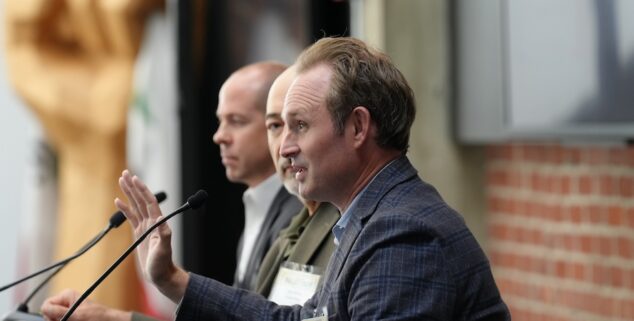News
CALIFORNIA BALLOT FORUM: Experts spar over 2024 propositions and election impacts
 Asm. James Gallagher speaks at Capitol Weekly's California Ballot Forum. California Democratic Party Chair Rusty Hicks, left; Capitol Weekly editor Rich Ehisen, center. Photo by Joha Harrison, Capitol Weekly
Asm. James Gallagher speaks at Capitol Weekly's California Ballot Forum. California Democratic Party Chair Rusty Hicks, left; Capitol Weekly editor Rich Ehisen, center. Photo by Joha Harrison, Capitol WeeklyThe following is a brief look at the keynote conversation from Capitol Weekly’s California Ballot Forum, featuring California Democratic Party Chair Rusty Hicks and Assembly Republican Leader Jim Gallagher (R-Yuba City) , moderated by CW Editor Rich Ehisen.
In the wake of Tuesday’s heated presidential debate, Capitol Weekly’s CALIFORNIA BALLOT FORUM: 2024 Election Preview brought together a diverse group of experts to discuss some of the most contentious issues on this year’s ballot: minimum wage, rent control, and penalties for theft and drug crimes.
The sparks flew early when representatives from the California Apartment Association and the AIDS Healthcare Foundation locked horns over Propositions 33 and 34, but tensions eased later in the program. Assembly Republican Minority Leader James Gallagher and California Democratic Party Chair Rusty Hicks provided a more civil exchange of ideas, even as they dissected what’s at stake in the upcoming congressional and legislative races.
Capitol Weekly Editor-in-Chief Rich Ehisen broke from proposition talk to probe Gallagher and Hicks on a pressing topic: the potential impact of a presidential ticket change from President Biden to Vice President Kamala Harris on California’s down-ballot races.
Gallagher conceded that the switch to Harris at the top of the ticket could indeed favor Democrats, acknowledging Harris’s ability to energize her base in a way Biden hadn’t managed. However, he argued that the top issue for voters this year is cost of living and claimed that the Democratic supermajority has failed to address bread-and-butter concerns like housing costs, gas prices, and everyday expenses.
“That frustration,” Gallagher said, “is where Republicans see an opening.”
Gallagher also pointed to concerns over job losses and the exodus of young professionals from California, emphasizing that Republican positions are more in tune with voter sentiment on these key issues. “We’re more aligned with voters on issues, and I think that’s going to pay dividends for us,” he remarked.
Hicks countered that Harris has run an almost flawless campaign, citing her debate performance as evidence. He believes Harris’s momentum at the national level will cascade down the ballot, motivating voters who might otherwise stay home. Hicks was quick to note that it’s not about Republicans winning over Democrats; it’s about Democrats turning out in larger numbers.
“Presidential elections make all the difference,” Hicks said.
Both leaders agreed that the battleground regions of the Central Valley and the Inland Empire would be critical. Hicks emphasized the importance of California in determining control of the House of Representatives, suggesting that there are as many as seven districts where Democrats have a shot. Gallagher argued that increased turnout would likely bring more independent voters to the polls, who might lean toward moderate Republicans like Greg Wallace.
While Harris may be energizing the Democratic base, she notably avoided emphasizing her California roots during the debate. Hicks dismissed this as a non-issue, saying, “She’s running for president of the United States, not the president of California. Certainly, we are proud to be supporting a daughter of California.”
Gallagher had a different take, suggesting that Harris is distancing herself from her past positions on issues like fracking and gun buybacks because they don’t play well on a national stage.
“I’m surprised I haven’t heard more of an outcry from the progressive left in California, like, ‘where is our Kamala?’” Gallagher mused.
The discussion also touched on a recent shift within California’s political landscape: Senator Marie Alvarado-Gil’s switch from the Democratic to the Republican Party—the first party switch of a sitting California lawmaker in 80 years. Gallagher pointed to this as a sign of broader discontent among voters and potential shifts in party affiliation.
Hicks had a different interpretation.
“Well, my fellow chair will have to deal with their new member in the legislature,” he quipped. “We’ve been watching a slow and sad pursuit of political relevance for quite some time, and so I wish her the best of luck.”
One point of agreement between Gallagher and Hicks was the significance of Proposition 36 in this election. Hicks criticized the measure, which would implement significant changes to California’s landmark voter-approved Proposition 47 law. Hicks called the new proposal a return to a “war on drugs” mentality, while Gallagher saw it as straightforward and uncontroversial.
The forum ended with a final spirited debate between advocates for and against Proposition 36, setting the stage for what promises to be a highly charged election season.
Want to see more stories like this? Sign up for The Roundup, the free daily newsletter about California politics from the editors of Capitol Weekly. Stay up to date on the news you need to know.
Sign up below, then look for a confirmation email in your inbox.

Leave a Reply